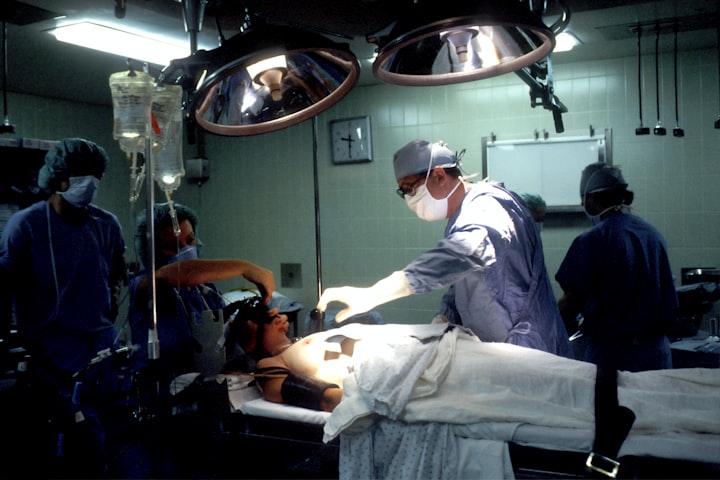
In a family, surprisingly, 8 people have cancer one after another. Could cancer be hereditary?
Ms. Zhou had a nodule on her thyroid gland before the birth of her second child, and she kept regular follow-ups for many years. After the birth of her second child, the nodule on Ms. Zhou's thyroid gland suddenly became larger, and Ms. Zhou, who is sensitive to diseases, was rushed to the hospital for examination.
Surprisingly, there are many cancer patients in Ms. Zhou's family. Eight family members, including her father, brother, aunt, uncle, and cousins, all have a history of cancer.
After being diagnosed with cancer, Ms. Zhou wanted to find out why her family had such a high probability of developing cancer.
After a thorough evaluation of Ms. Zhou's family history, doctors concluded that they might have a rare genetic tumor syndrome called Lineament syndrome, and subsequent molecular case studies confirmed the doctors' judgment. Developing this disease leads to an increased risk of cancer, usually at a young age, and may result in multiple tumors of different systems.
Stories of family cancer are not uncommon.
There was a woman in the United States who passed away from stomach cancer. After she was gone, 10 people in her family died from stomach cancer one after another. Genetic testing of the family's offspring revealed that they all had the mutation gene for familiarly inherited gastric cancer.
The high incidence of familial cancer has also brought anxiety to many people. Many people are afraid that cancer is brought in their genes and cannot be avoided, can cancer be hereditary or not?
I. Can cancer be hereditary or not? About 10% of cancers are related to heredity
According to Zhang Kari of the Cancer Prevention Department of Cancer Hospital of the Chinese Academy of Medical Sciences, cancer does have the possibility of heredity. The percentage of cancers with obvious genetic emotion is about 10%, and cancer itself is a disease caused by genetic defects. When one or more groups of genes in the body have abnormal mutations, it will allow cells to proliferate abnormally in the body and then rapidly form malignant tumors.

A study published in the Journal of the American Medical Association, conducted by researchers from Harvard University, Denmark, and the Finnish Research Institute, found that at least 22 types of cancer are genetic diseases that are passed down through generations in families. If a sibling in the family develops these cancers, the risk of other siblings developing the cancer increases by 33%, and the risk varies by cancer.
It is important to note that there is uncertainty in the inheritance of cancer and not all members of the family will develop cancer, so there is no need to worry too much about it.
Especially, if someone in the family has these 6 types of cancer, you should pay attention to them, and your children may "inherit" them.
When a family member suffers from these types of cancer, you should pay special attention to the fact that your children may inherit the susceptibility gene.
Lung cancer
Clinical data show that about 35.8% of patients with non-squamous cell carcinoma have a family history. Among female lung cancer patients, 58.3% of those with alveolar cell carcinoma have a family history of the disease. An effective screening test for lung cancer is low-dose spiral CT, which can detect microscopic lesions in the lungs.
It is also important to avoid factors that may trigger the development of lung cancer, including smoking, exposure to secondhand smoke, and exposure to oil fumes.
Bowel Cancer
About 20-30% of bowel cancer patients have a family history of the disease, and if one parent has bowel cancer, the risk of the child will increase to 50%.
To prevent bowel cancer daily, we need to maintain a healthy diet, increase the intake of dietary fiber and crude fiber, and actively exercise to prevent obesity.
Stomach Cancer
About 10% of gastric cancer patients tend to gather in families, and when there are gastric cancer patients in the immediate family, the risk of developing the disease increases 2 to 3 times more than others.
The gold standard for screening for stomach cancer is gastroscopy, and people at high risk should be examined early. It is recommended to maintain healthy eating habits and not overeat. It is also important to prevent Helicobacter pylori infection and stop smoking and limit alcohol consumption.
Breast cancer
Breast cancer has a clear genetic predisposition. If a mother has breast cancer, her daughter's risk of developing cancer will increase by 2 to 3 times.
For this group of people, it is recommended to have breast screening at an earlier age of about 30 years old, and an ultrasound and a mammogram can be performed. To prevent breast cancer, it is important to stay away from smoking and alcohol and maintain a reasonable nutritional intake and a healthy weight.
Pharyngeal cancer
pharyngeal cancer has an obvious tendency to run in families and to gather in regions. People with a family history of pharyngeal cancer must have regular EBB tests.
People with a family history of pharyngeal cancer should have regular EBB tests. They should reduce the intake of pickled foods, quit smoking, and prevent the inhalation of other harmful fumes.
Pancreatic cancer
About 5-10% of pancreatic cancers are hereditary. When there are pancreatic cancer patients in your immediate family, your risk of developing cancer is higher than that of the general population, and most of them will develop it before the age of 50.
For pancreatic cancer, screening can be done through abdominal CT, ultrasound, MRI, and tumor markers. Daily, you should pay attention to maintaining a light diet, quit smoking and limit alcohol, and don't let your body become too obese, etc.
When cancer comes, the body will send out signals, that many people ignore.
When cancer comes to your door, your body will show a series of abnormalities. If you find these abnormalities in your body, you must be alert in time.
When the body is found to have unexplained weight loss, such as weight loss of more than 10% within 3 months; the body shows abnormal blood in stool with dark color and mixed with feces. If abnormal lumps appear on the surface of the body and keep increasing in size within a short period; if the cough is untreated for a long time and is irritating and dry, be on high alert for lung cancer; if the symptoms of weakness appear for no reason and cannot be relieved by rest, etc.
If these symptoms appear and last for more than half a month, you should be alert to the possibility that they are caused by cancer, but not necessarily all of them are caused by cancer. It is recommended to seek medical examination in time after discovering the abnormality to clarify what factors are causing it, and not to scare yourself.
4. How to prevent cancer if there is a family history of cancer?
Some people with family history, may not necessarily suffer from cancer. Four things can be done to help prevent cancer in their daily life.
1. Genetic screening
It is recommended to go for genetic testing as early as possible to detect abnormal mutations in genes so that timely intervention can be made, which can greatly reduce the risk of cancer.
2. Regular physical examination
Physical examination is also one of the important measures to prevent cancer. For cancer with a genetic tendency in the family, screening can be done earlier than normal people. Even if you are unfortunate to have cancer, it can be detected and treated early.
3. Stay away from cancer-causing factors
It is important to stay away from risk factors that may induce cancer, such as smoking, alcohol consumption, unhealthy eating habits, obesity, and lack of exercise.
4. Maintain a healthy lifestyle
To maintain a healthy diet, lifestyle, and exercise, it is important to make changes in detail and persist in them for a long time to help prevent cancer.
Cancer indeed has a certain genetic tendency, but not all cancers are caused by heredity. It is more important to maintain healthy habits in life, have regular medical checkups, and take preventive measures to actively prevent cancer.






Comments
There are no comments for this story
Be the first to respond and start the conversation.